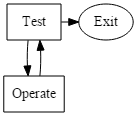TOTE Model For Testers - Test, Operate, Test, Exit
Learn to map the TOTE (Test, Operate, Test, Exit) model onto TDD, exploratory testing, design processes, analysis, learning, and more.
Join the DZone community and get the full member experience.
Join For Free

tote
in 1960, george miller, presented a model of problem solving which he called the t.o.t.e model :
- test, operate, test, exit.
the notion is that you loop around a [test, operate]* cycle and when your test is complete, then you have done enough operations and you can exit. it was a model of problem solving, or decision making. i wrote about it a while back on
the blog
and in my
nlp papers
you can find george miller’s book
plans and the structure of behavior
on archive.org. he describes the tote model in that book.
tote in action
showing t.o.t.e in action. i drew this dynamically to make the point that it is a cyclical process and we test to decide if we continue to operate, to exit the process, and to change what we will operate.

you can see the
9 second version on instagram
.
we test to build a model, and sometimes we exit because things are good enough, but we still need criteria to determine what good enough means. sometimes we operate to learn if something is good enough.
tote for learning
at the time that i explored the tote model previously, i didn’t make the connection that the arc from
operate -> test
was also a feedback process.
in the tote model, the test learns from operate, which we can easily map on to exploratory testing:
-
we come up with an idea to explore (
test). -
we explore (
operate). -
we learn from that (
operate -> test). -
we derive new things to explore (
test). - et cetera.
we
exit
when our time has finished or when we have covered our ideas or whatever other ‘exit’ criteria we started our testing with.
tdd tote
i’ve also written a lot more code using tdd, and i know that my tdd process very often resembles a tote process:
-
write some
@testcode (test). -
see if it fails and write some code to make the test pass (
operate). -
write more
@testcode to flesh out the design (test). - repeat.
until our design is complete, or our review of our
@test
and code can’t come up with anything new, and we have compared it with our statement of intent, etc.
tote learning
we could view this as a completely well-defined process of evaluation where at every ‘test’ point we know exactly what we are deciding upon and use the pre-defined evaluation criteria.
we could also view the operate process as a learning process which feeds into the test process and explains the cycle. each time we ‘do’ something (operate), we learn something which we feed into the test process.
i missed the learning process inherent in the
operate -> test
arc first time around.
i won’t do that again, and that makes tote an even better model for the type of work i do.
a model worth investigating.
see also
Published at DZone with permission of Alan Richardson, DZone MVB. See the original article here.
Opinions expressed by DZone contributors are their own.

Comments